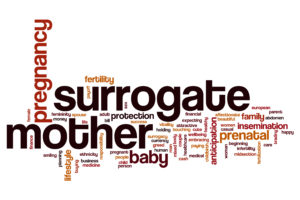Robbie Williams, 44 and his 39 year old wife Ayda Field recently announced the birth of their third child, Colette “Coco” Josephine Williams. The announcement on Instagram came as a surprise to fans as the couple had kept their baby plans under wraps and only revealed the news once Coco was born. Ayda Field has since revealed that she and Robbie had opted for a surrogate mother and artificial insemination.
The reasons as to why the couple opted to go down the surrogacy route is not within the public domain, aside from the couple confirming that it has been “a long and difficult path to get here which is why we kept it on the down-low”. The couple confirmed that Coco is “biologically theirs” and stated that they felt “blessed to live in a world which makes this possible”.
Surrogacy has hit the headlines in recent years as a series of other celebrities have opened up about their surrogacy journey including Olympian Tom Daley, footballer Cristiano Ronaldo and reality television celebrity Kim Kardashian West. However, surrogacy arrangements are still relatively rare in the UK compared to other countries. One of the main factors for this is arguably due to the fact that commercial surrogacy arrangements are not legal in the UK, unlike in the US and many European countries.

Surrogacy is when a woman carries a baby for someone who is unable to conceive or carry a child themselves.
For intended parents who struggle to have children through traditional means surrogacy can offer them something different from adoption: the chance to have a genetic relationship to a child.
Traditional Surrogacy
Traditional surrogacy (also known as full or straight) surrogacy is when the surrogate provides her own eggs to achieve the pregnancy. The pregnancy can be achieved by insemination (natural or artificial) or by IVF to create an embryo using the surrogate’s eggs and the sperm of one of the intended parents which is then implanted into the surrogate mother’s uterus.
Gestational Surrogacy
Gestational (also known as host) surrogacy is when the surrogate doesn’t provide her own egg to achieve the pregnancy. In such pregnancies, embryos are created in vitro and transferred into the uterus of the surrogate.
Under UK law when a baby is born, the woman who gives birth is recognised as the legal mother, regardless of whether she is genetically related to the child. Furthermore, if the surrogate mother is married, her partner is recognised as the other legal parent of the child. The intended parents therefore have to apply to the courts for a Parental Order in order to be legally recognised as the child’s parents.
According to the CAFCASS national database which records the number of Parental Order applications received by the courts in England and Wales, surrogacy rates are said to have increased by 90% over the last five years. Many commentators identify different reasons as to why there may have been such a sharp increase in recent years. Some claim that the shift could be attributable to the steep decrease in the number of children entering the pool of adoptable children. Others consider that advances in assisted reproductive techniques could be responsible.
Our family team at Bishop & Sewell is passionate about assisting intended parents with their surrogacy journey. The law surrounding surrogacy can be somewhat of a minefield and a rather daunting process for most. There is much confusion surrounding the legality of surrogacy in the UK. The government have recommended that any intended parents considering this route as a means to expanding their family should seek legal advice as soon as possible.
If you are thinking of entering into a surrogacy arrangement and require advice about the process or need to obtain a Parental Order please contact Louise or Victoria from our expert Family & Divorce team who will be able to assist you. Alternatively, please email family@bishopandsewell.co.uk or call 020 7631 4141.




